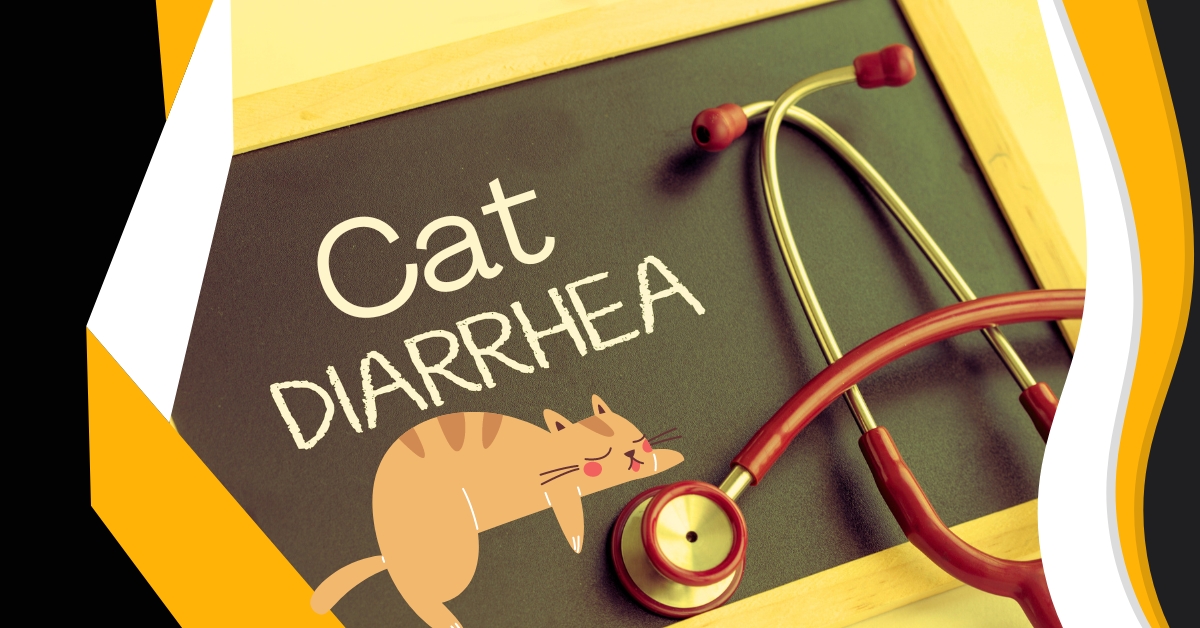Diarrhea is a common issue for many pet owners, and when your cat experiences it, it can be a worrying and unpleasant situation. Cat diarrhea can range from mild and short-lived to chronic and severe, depending on the underlying cause. Understanding the triggers, treatments, and when to seek veterinary care is crucial for ensuring your cat’s health and comfort.
In this guide, we’ll discuss the most common causes of cat diarrhea, how to manage it at home, and when to consult a vet. We’ll also cover essential tips on what to feed a cat with diarrhea and how to prevent it from happening in the first place. By following these guidelines, you can help your cat recover quickly and ensure they stay healthy and happy.
1. What Causes Cat Diarrhea? Understanding the Common Triggers
Cat diarrhea can be caused by various factors, ranging from simple dietary changes to more serious health conditions. Knowing the underlying cause is the first step to effective treatment. Here are some of the most common triggers for diarrhea in cats:
- Dietary changes: One of the most common causes of diarrhea is a sudden change in diet. Introducing new food too quickly can upset a cat’s digestive system, leading to loose stools. Gradually transitioning your cat to a new diet can help prevent this.
- Food allergies: Some cats have food allergies or intolerances, especially to certain proteins like beef, dairy, or grains. If your cat has persistent diarrhea, it may be a sign of a food allergy.
- Infections: Bacterial, viral, or parasitic infections, such as giardia or intestinal worms, can cause diarrhea. These infections often require veterinary treatment.
- Stress: Cats are sensitive creatures, and stress can affect their digestive system. Moving to a new home, introducing new pets, or changes in their environment can all lead to temporary diarrhea.
- Medications: Certain medications, especially antibiotics, can disrupt the balance of gut bacteria and cause diarrhea as a side effect.
- Underlying health conditions: Chronic illnesses such as inflammatory bowel disease (IBD), hyperthyroidism, or kidney disease can result in long-term diarrhea. If diarrhea persists, it’s important to consult a vet to rule out serious health problems.
Identifying the cause of your cat diarrhea is key to determining the best course of action. In the next section, we’ll explore how to treat and manage this condition at home.
2. How to Stop Cat Diarrhea: Home Remedies and Treatments
If your cat is experiencing mild diarrhea, there are several home remedies and treatment options that can help alleviate the symptoms and restore their digestive health. Here’s how to manage cat diarrhea at home:
- Fasting for 12-24 hours: If your cat has mild diarrhea, withholding food for 12-24 hours can give their digestive system a chance to rest and recover. Be sure to provide plenty of fresh water during this time to prevent dehydration.
- Introduce a bland diet: After the fasting period, introduce a bland diet to soothe your cat’s stomach. The best foods include boiled chicken (without bones or skin), plain rice, or pumpkin puree. Pumpkin is high in fiber and can help firm up loose stools. Gradually reintroduce your cat’s regular food over the next few days.
- Hydration is key: Diarrhea can quickly lead to dehydration, so it’s crucial to ensure your cat is drinking enough water. You can also offer unsalted chicken broth to encourage fluid intake.
- Probiotics: Probiotics, available at most pet stores, can help restore the healthy bacteria in your cat’s gut. Probiotic supplements or specialized cat food containing probiotics can support your cat’s digestive health.
- Monitor your cat closely: If your cat’s diarrhea persists for more than a day or two, or if they exhibit additional symptoms like vomiting, lethargy, or loss of appetite, it’s essential to consult a veterinarian. These could be signs of an underlying health issue that requires professional care.
By following these home remedies and treatments, you can often stop mild cat diarrhea and restore your pet’s normal digestion.
3. When Should You See a Vet for Cat Diarrhea? Red Flags to Watch For
While some cases of cat diarrhea are mild and resolve on their own, there are times when veterinary attention is essential. It’s important to know the red flags that indicate a more serious issue requiring immediate care:
- Diarrhea lasting more than 48 hours: If your cat has diarrhea that persists for more than two days, it’s time to consult a vet. Prolonged diarrhea can lead to dehydration and may signal an underlying health condition.
- Blood in the stool: The presence of blood in your cat’s diarrhea is a serious sign that something is wrong. Blood could indicate an injury to the digestive tract, severe infection, or even a more serious condition like cancer.
- Vomiting and diarrhea: If your cat is vomiting in addition to diarrhea, it could be a sign of poisoning, infection, or gastrointestinal obstruction. These symptoms together are a reason to seek immediate veterinary care.
- Dehydration: Cats can become dehydrated very quickly when they have diarrhea. Signs of dehydration include dry gums, sunken eyes, and lethargy. If your cat shows any of these symptoms, it’s important to get them to a vet right away.
- Loss of appetite: If your cat refuses to eat, this can be another indicator that something more serious is happening. Lack of appetite combined with diarrhea often requires medical intervention.
- Weight loss or weakness: Rapid weight loss or significant weakness should not be ignored. These symptoms may point to chronic conditions that need ongoing treatment.
In any of these cases, taking your cat to the vet is essential for a proper diagnosis and treatment plan. The sooner you act, the better chance your cat has of a full recovery.
4. What to Feed in Cat Diarrhea: Diet and Hydration Tips
Knowing what to feed a cat with diarrhea is critical for helping them recover. A proper diet can soothe the digestive system and promote healthy bowel movements. Here are some recommended foods and hydration tips:
- Bland, easily digestible foods:The best foods for a cat with diarrhea are bland and easy to digest. Boiled chicken breast (without skin or bones), plain white rice, and pumpkin puree (without added sugar or spices) are excellent choices. These foods are gentle on your cat’s stomach and can help firm up their stools, making them ideal for managing cat diarrhea and aiding in their recovery.
- Pumpkin for fiber: Adding pumpkin to your cat’s diet is a great way to increase their fiber intake, which can help regulate bowel movements. Pumpkin helps absorb excess water in the intestines, making stools firmer. Start with a teaspoon of plain, canned pumpkin and mix it into their food.
- Hydration is essential: Cats with diarrhea can easily become dehydrated, so ensuring your cat drinks enough water is vital. You can add water to their food or offer unsalted chicken broth to increase their fluid intake.
- Small, frequent meals: Instead of feeding your cat large meals, try offering smaller portions throughout the day. This gives their digestive system a chance to process food more easily.
- Avoid dairy and fatty foods: While some cats enjoy dairy products, milk can often cause or worsen diarrhea due to lactose intolerance. Avoid feeding your cat dairy, fatty foods, or anything too rich, as this can irritate their stomach.
Once your cat’s stools start to return to normal, you can gradually reintroduce their regular diet over a few days. If cat diarrhea returns after reintroducing their regular food, it may be a sign of a food allergy or intolerance.
Looking for more insights on pet-friendly snacks? Check out our guide, Can Dogs Eat Bell Peppers? 7 Essential Facts Every Dog Owner Should Know, and discover how bell peppers can be a healthy treat for your furry friend!
FAQs About Cat Diarrhea
- What causes diarrhea in cats?
Cat diarrhea can be caused by several factors, including dietary changes, food allergies, infections, parasites, stress, medications, or underlying health conditions like inflammatory bowel disease (IBD) or hyperthyroidism. - What should I do if my cat has diarrhea?
If your cat has mild diarrhea, try withholding food for 12-24 hours while ensuring they stay hydrated. Afterward, introduce a bland diet such as boiled chicken and rice. If diarrhea persists for more than 48 hours or if your cat shows other symptoms, consult a vet. - When should I take my cat to the vet for diarrhea?
You should see a vet if your cat diarrhea lasts more than 48 hours, if there is blood in the stool, if the diarrhea is accompanied by vomiting, lethargy, or loss of appetite, or if your cat shows signs of dehydration. - What should I feed a cat with diarrhea?
Feed your cat a bland diet of boiled chicken and plain white rice or pumpkin puree. Avoid rich, fatty foods, dairy products, and treats that could further irritate their digestive system. - Can stress cause diarrhea in cats?
Yes, stress can trigger diarrhea in cats. Changes in their environment, new pets, travel, or moving homes can cause stress, which affects the cat’s digestive system and may result in diarrhea. - Can I give my cat medication for diarrhea?
Avoid giving your cat any medication to treat cat diarrhea without first consulting a veterinarian. Some over-the-counter medications intended for humans can be dangerous for cats. Your vet may prescribe appropriate medications if necessary. - How can I prevent diarrhea in my cat?
To prevent diarrhea, maintain a consistent diet for your cat, avoid sudden changes in food, ensure they are up to date on parasite prevention, and avoid giving them human food. Always introduce new foods gradually over 7-10 days. - What are the signs of dehydration in cats with diarrhea?
Signs of dehydration in cats include dry gums, sunken eyes, lethargy, and a decrease in skin elasticity. If you suspect dehydration, it’s important to see a vet immediately, as this can be life-threatening. - Can food allergies cause diarrhea in cats?
Yes, food allergies or intolerances can cause chronic diarrhea in cats. Common allergens include certain proteins like beef, dairy, or grains. If you suspect a food allergy, an elimination diet may help identify the cause. - How long does it take for a cat’s diarrhea to stop?
In mild cases, cat diarrhea may resolve within 24-48 hours with home care and a bland diet. However, if diarrhea persists or worsens, a vet consultation is necessary to determine the underlying cause and treatment plan.
Conclusion
Cat diarrhea is a common problem that can be caused by various factors, from dietary changes to underlying health conditions. While many cases of diarrhea resolve on their own with simple home remedies and diet adjustments, it’s essential to know when to consult a veterinarian. Understanding the potential causes, treatments, and preventive measures can help you provide the best care for your cat.
In this guide, we’ve explored what to feed a cat with diarrhea, the red flags to watch for, and how to manage both acute and chronic diarrhea. By staying informed and taking proactive steps, you can ensure your cat’s digestive health remains in optimal condition.
If your cat is suffering from chronic diarrhea or other serious symptoms, don’t hesitate to seek veterinary care to diagnose the underlying issue and develop an appropriate treatment plan.

Joseph Bush is a seasoned writer and researcher with over 7 years of experience covering a wide range of general topics, from lifestyle and technology to business and current events. He is dedicated to producing fact-checked, reader-friendly content that informs, engages, and empowers readers.
Throughout his career, Joseph has followed strict editorial guidelines, relied on reputable sources, and ensured every article meets the highest standards of accuracy and clarity. His expertise spans multiple fields, allowing him to explain complex topics in a way that’s easy to understand.
Passionate about continuous learning, Joseph stays updated on industry trends and best practices to deliver trustworthy, well-rounded insights. Readers can rely on his work for its credibility, depth, and real-world relevance.




